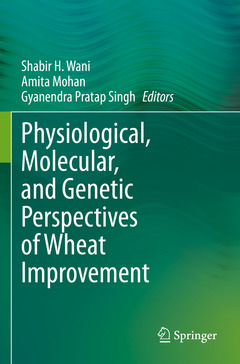Physiological, Molecular, and Genetic Perspectives of Wheat Improvement, 1st ed. 2021
Coordonnateurs : Wani Shabir H, Mohan Amita, Singh Gyanendra Pratap

World population is growing at an alarming rate and may exceed 9.7 billion by 2050, whereas agricultural productivity has been negatively affected due to yield limiting factors such as biotic and abiotic stresses as a result of global climate change. Wheat is a staple crop for ~20% of the world population and its yield needs be augmented correspondingly in order to satisfy the demands of our increasing world population. ?Green revolution?, the introduction of semi-dwarf, high yielding wheat varieties along with improved agronomic management practices, gave rise to a substantial increase in wheat production and self-sufficiency in developing countries that include Mexico, India and other south Asian countries. Since the late 1980?s, however, wheat yield is at a standoff with little fluctuation. The current trend is thus insufficient to meet the demands of an increasing world population. Therefore, while conventional breeding has had a great impact on wheat yield, with climatechange becoming a reality, newer molecular breeding and management tools are needed to meet the goal of improving wheat yield for the future. With the advance in our understanding of the wheat genome and more importantly, the role of environmental interactions on productivity, the idea of genomic selection has been proposed to select for multi-genic quantitative traits early in the breeding cycle. Accordingly genomic selection may remodel wheat breeding with gain that is predicted to be 3 to 5 times that of crossbreeding. Phenomics (high-throughput phenotyping) is another fairly recent advancement using contemporary sensors for wheat germplasm screening and as a selection tool. Lastly, CRISPR/Cas9 ribonucleoprotein mediated genome editing technology has been successfully utilized for efficient and specific genome editing of hexaploid bread wheat. In summary, there has been exciting progresses in the development of non-GM wheat plants resistant to biotic and abiotic stress and/or wheatwith improved nutritional quality. We believe it is important to highlight these novel research accomplishments for a broader audience, with the hope that our readers will ultimately adopt these powerful technologies for crops improvement in order to meet the demands of an expanding world population.
Dr. Shabir Hussain Wani is an Assistant professor (Senior scale), genetics and plantbreeding at Mountain Research Centre for Field Crops, Khudwani –192101, Sher-e-Kashmir University of Agricultural Sciences and Technology of Kashmir, J&K, India. He received Ph.D. degree in plant breeding and genetics on “transgenic rice for abiotic stress tolerance” from the Punjab Agricultural University Ludhiana, India. After obtaining his Ph.D. he worked as research associate in the Biotechnology Laboratory, Central Institute of Temperate Horticulture (ICAR), Srinagar, India. He then joined the Krishi Vigyan Kendra (Farm Science Centre) as program coordinator at Senapati, Manipur, India. He teaches courses related to plant breeding, seed science and technology, and stress breeding and has published more than 100 papers/chapters in journals and books of international and national repute. He served as guest editor and reviews editor for journal Frontier in Plant Science (2015-2018). Hehas also edited several books on current topics in crop improvement for abiotic stress tolerance published by Springer Nature and CRC press USA. His Ph.D. research fetched first prize in the North Zone Competition, at national level, in India. He was awarded Young Scientist Award from the Society for Promotion of Plant Sciences, Jaipur, India, in 2009. He is a fellow of the Society for Plant Research, India. Recently he also received Young Scientist Award (Agriculture) 2015 from Society for Plant Research, Meerut, India. He also served as visiting Scientist at Department of Plant Soil and Microbial Sciences, Michigan State University, USA under the UGC Raman Post Doctoral Fellowship programme. Currently, he is in charge of Wheat improvement programme at MRCFC Khudwani, SKAUST Kashmir.
Dr. Amita Mohan is an Adjunct Assistant Professor, Temple University, and research scientist, University of Pennsylvania, Philadelphia, Pennsylvania, USA. She previously worked as an Assistan
Date de parution : 12-2021
Ouvrage de 293 p.
15.5x23.5 cm
Date de parution : 12-2020
Ouvrage de 293 p.
15.5x23.5 cm
Disponible chez l'éditeur (délai d'approvisionnement : 15 jours).
Prix indicatif 242,64 €
Ajouter au panierThèmes de Physiological, Molecular, and Genetic Perspectives of... :
Mots-clés :
phenomics; photosynthesis; metabolism; genomics; biotechnology
Ces ouvrages sont susceptibles de vous intéresser

Wheat Diseases and Their Management 105,49 €


